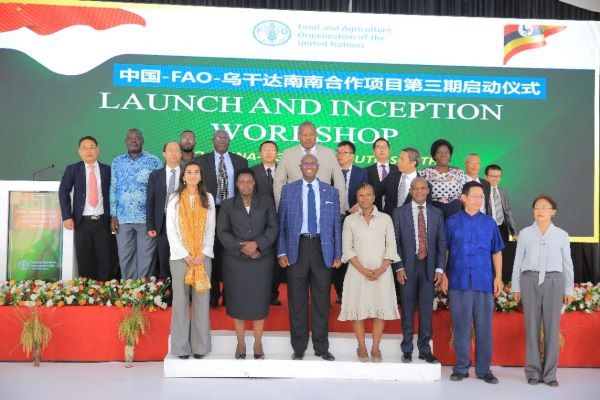Up to 9,600 crop, livestock and fish farmers in Uganda are set to improve their farming ventures following a $12m project that has been launched in the country in partnership with China and the United Nations Food and Agriculture Organization of the United Nations (FAO).
The project dubbed South-South Cooperation (SSC) is entering its third phase that will run for three years. This follows dramatic results in the first and second phases that included quadrupling of rice production per hectare in the project areas, as well as increased milk production.
In the partnership, Uganda agreed to provide nearly $10 million for the project, China will commit nearly $2.4 million while FAO and China will team up to implement the programme.
According to the organisers Phase III will focus on four main areas: establishing an integrated technology transfer base; developing high-yielding plans for rice and foxtail millet; supporting livestock improvement programmes; and developing aquaculture value chains.
“This project will contribute to ensuring food security and nutrition, income generation, decent job creation especially for the youth and women and improve livelihoods of the selected farmers,” said Zhang Xiaoqiang, team leader of the project.
Targeted farmers
Among the 9,600 farmers targeted by the project include 3,000 women, 1,000 livestock farmers, 100 fish farmers and small-scale crop famers of mainly rice and foxtail millet in 30 districts across the country.
The producers will be provided with access to farm inputs, technical assistance, training and knowledge exchange from Chinese experts.
“We urge the beneficiaries, who are selected in coordination with the Ministry of Agriculture, Animal Industry and Fisheries and the district agriculture officials, to show interest in adopting new technologies and avail the land for it,” said Xiaoqiang.
The partners have been implementing the project since 2012 with the second phase running from 2016-2018.
Chinese experts
About ten Chinese experts will be based in the country to help facilitate exchange of modern farming knowledge, technology transfer and capacity building.
They will be conducting field trainings to lead farmers who will in turn train other farmers and in the end the project aims to establish four hub headquarters for integrated technology, livestock, cereals and aquaculture in Luweero, Mbarara, Butaleja and Kajjansi districts.
Some of the new technologies that are expected to be deployed include rice-fish culture, where farmers can rear fish in paddy rice fields to maximize land use and generate more income.
“we are looking to facilitate a broader system that will ensure over 10 million fingerlings are produced for farmers, produce over 15 million metric tonnes of fish feeds and establish at least 100 rice-fish culture farms,” said the project brief.
Impact
According to Antonio Querido, the country FAO representative, since the programme started there have been some positive impacts on food security and poverty alleviation in a number of intervention areas.
“Because of the benefits that we have witnessed in the past, this phase will focus more on women and the youth to improve their income and livelihoods,” said Querido.
The first two phases of the project achieved remarkable results, with rice production increasing fourfold, from 2.5 tonnes to 10 tonnes per hectare and milk production rising from 2 to 7 liters per cow per day in some of the project areas.
Furthermore, low-cost fish feeding techniques increased aquaculture production while rice-fish, foxtail millet and mushroom production increased revenues for farmers.
Additionally, the project contributed to the establishment of Uganda-China Agro-industrial Park in two districts, aimed at boosting animal and crop production and processing to meet the burgeoning domestic and regional demand for processed agricultural products.








